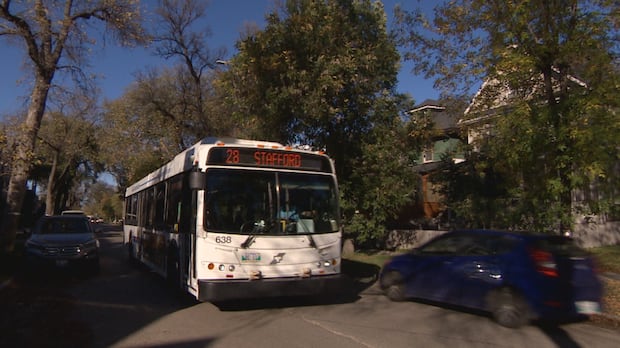ManitobaA city planning expert says transit’s new network is hurting lower-income people who rely on the bus, and over a dozen groups across Winnipeg showed support for that message in a recent letter to city council.’People’s jobs and livelihoods are at risk’ under unreliable system, says Orly LinovskiCBC News · Posted: Oct 17, 2025 7:04 PM EDT | Last Updated: 5 hours agoA letter calling on Winnipeg’s mayor and city council to boost investments for transit in light of a recent overhaul has received support from 16 groups across the city. (Randall McKenzie/CBC)A city planning expert says Winnipeg Transit’s new network is hurting lower-income people who rely on the bus — a message supported by over a dozen groups in a recent letter to city council.Orly Linovski, an associate professor in the University of Manitoba’s city planning department, penned the Thursday letter, which was endorsed by 16 groups, including the Canadian Centre for Policy Alternatives, the U of M’s city planning department, the Manitoba Eco-Network, the North End Women’s Centre and the Social Planning Council of Winnipeg.Linovski says transfer times under the new system are too long and unreliable because there aren’t enough buses.”People’s jobs and livelihoods are at risk because of issues with unreliable public transit,” she told CBC News on Friday.”If you work a job where you need to swipe in and you’re five minutes late, you may be docked half an hour or an hour of pay. If you’re 15 minutes late to pick up your kids from daycare, you’re charged extra.”Winnipeg Transit launched its major route overhaul in late June, changing nearly every route in the network as it moved to a grid-like “spine-and-feeder” system. The new system has drawn widespread complaints about issues ranging from the distance between stops to a lack of late-night service. The city has made some tweaks to the system already and said it will make more in December, but Linovski says changes are urgently needed.”In Winnipeg, with our climate, the expectation that people will wait 30 or 40 minutes for a transfer is unreasonable,” she said.The city needs the political will to increase funding to ensure adequate transit service, said Linovski.”If you’re just shifting frequency on different routes, it means that other routes are going to be less frequent.”Transit in ‘transition period’Coun. Janice Lukes, who chairs the city’s public works committee, says the city’s funding model is “antiquated,” and there’s only so much that can be done to enhance bus service until the city can get more funding from provincial and federal governments. “The only way we can do better and bigger is by either increasing taxes or changing priorities,” she told CBC News on Friday. “Every city in Canada is facing this challenge.”Winnipeg Transit is currently in a “transition period,” Lukes said, but the city appreciates all of the feedback it’s been getting from riders.”The bigger route adjustments will have to come in a year’s time, but we’re making a lot of adjustments. The most important thing is [for] people send in their feedback,” she said.Linovski’s letter is a reflection of why the city “should be doing a better job of expressing and explaining to people how much we’re investing” in Winnipeg Transit, which the city subsidized to the tune of about $123 million last year, said Lukes.”When you look at the operating costs of Transit and the capital costs of Transit, it’s actually more than roads, [and] eight per cent of people take the bus,” she said. “We are investing more than ever in Transit.”In a statement, Mayor Scott Gillingham said that since 2020, Winnipeg Transit’s overall operating budget has grown by 27 per cent while the city’s subsidy for the service has ballooned.He also pointed to improvements like rolling out new zero-emission buses, and service improvements in response to rider feedback, like adding more late-night buses.”These are the biggest improvements in Transit’s history, and we’re committed to building on that progress,” Gillingham’s statement said.’They don’t want to take the bus anymore’North End Women’s Centre associate executive director Kris Beaune says the organization sees upwards of 100 people a day for its programming, and both the community and her own staff have been struggling with the new bus network.”This is a big, big change,” she told CBC Friday. “Folks that are most impacted are those who live in poverty, who don’t have any other access to any other transportation.”For people who don’t have access to cellphones or computers, “it’s really difficult to learn the new system, and the new distance people have to walk to get to a new bus stop lacks the accessibility that we would hope for in a transit system,” said Beaune.”Transit is their lifeline to get to and from where they’re needing to go. The accessibility has decreased so significantly.”Kris Beaune, associate executive director of the North End Women’s Centre, says the community and her own staff have been struggling with the new transit network. (Josh Crabb/CBC)Janel Whincup, a counsellor at the North End’s Women Centre, says navigating the new system has been confusing for many, and some clients have said they’re discouraged by the changes.”For the elderly people, for people that have disabilities [or] small children, I don’t know that getting used to it is an option,” she said.”They don’t want to take the bus anymore, because … it leaves people having to spend more time walking in unsafe areas.”Whincup, a single mother who drops her kids off at daycare in the morning, says it’s been challenging for her to get around the city by bus too.”I’ve been late for work a few times, which has resulted in me taking Ubers much more than I would like.”WATCH | Groups call for Winnipeg Transit changes:Route overhaul seen as setback for inner city transit riders Several inner city organizations are among the groups who’ve added their voices to a city planning prof’s letter criticizing Winnipeg Transit’s new spine and feeder system. The North End Women’s Centre says accessibility has decreased for clients who use the system as a ‘lifeline’ to get where they need to go. With files from Josh Crabb
Thursday, 5 Mar 2026
Canada – The Illusion
Search
Have an existing account?
Sign In
© 2022 Foxiz News Network. Ruby Design Company. All Rights Reserved.
You May also Like
- More News:
- history
- Standing Bear Network
- John Gonzalez
- ᐊᔭᐦᑊ ayahp — It happened
- Creation
- Beneath the Water
- Olympic gold medal
- Jim Thorpe
- type O blood
- the bringer of life
- Raven
- Wás’agi
- NoiseCat
- 'Sugarcane'
- The rivers still sing
- ᑲᓂᐸᐏᐟ ᒪᐢᑿ
- ᐅᑳᐤ okâw — We remember
- ᐊᓂᓈᐯᐃᐧᐣ aninâpêwin — Truth
- This is what it means to be human.
- Nokoma











